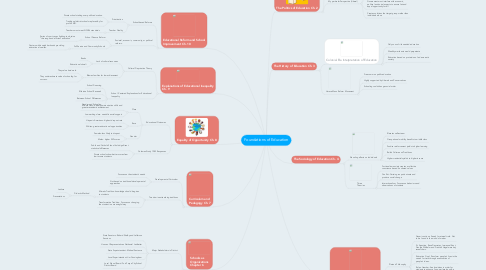
1. Schools as Organizations Chapter 6
1.1. Major Stakeholders in District
1.1.1. State Senators: Richard Shelby and Jefferson Sessions
1.1.2. House of Representatives: Nathaniel Ledbetter
1.1.3. State Superintendent: Michael Sentance
1.1.4. Local Superintendent: Jim Cunningham
1.1.5. Local School Board: Fort Payne City School District Board
1.2. Elements of Change within school processes and cultures
1.2.1. Must notify stakeholders in system
2. Curriculum and Pedagogy Ch. 7
2.1. Developmental Curriculum
2.1.1. Focuses on the student's needs
2.1.2. Not based on traditional developmental approaches
2.2. Two dominant teaching traditions
2.2.1. Mimetic Tradition- knowledge should be given to students
2.2.1.1. Didactic Method
2.2.1.1.1. Ledture
2.2.1.1.2. Presentations
2.2.2. Transformative Tradition- Focuses on changing the student in a meaningful way
3. Equality of Opportunity Ch. 8
3.1. Educational Outcomes
3.1.1. Class
3.1.1.1. Middle class- better communication skills and greater academic achievement
3.1.1.2. Low working-class- needs financial support
3.1.2. Race
3.1.2.1. Hispanic Americans- highest dropout rate
3.1.2.2. Whites- greater educational opportunities
3.1.3. Gender
3.1.3.1. Females-less likely to dropout
3.1.3.2. Males- higher SAT scores
3.2. Coleman Study 1982 Responses
3.2.1. Public and Catholic School hold significant statistical differences
3.2.2. Private schools show better scores from low-income students
4. Explanations of Educational Inequality Ch. 9
4.1. Cultural Deprivation Theory
4.1.1. Lack of cultural resources
4.1.1.1. Books
4.1.1.2. Educational stimuli
4.1.2. Blames families for low achievement
4.1.2.1. They value hard work.
4.1.2.2. They underestimate value of schooling for success.
4.2. School -Centered Explanations for Educational Inequality
4.2.1. School Financing
4.2.2. Effective School Research
4.2.3. Between-School Differences
4.2.4. Gender and Schooling
5. Educational Reform and School Improvement Ch. 10
5.1. School-based Reforms
5.1.1. Privatization
5.1.1.1. Private schools taking over public education.
5.1.1.2. Traditional district schools replaced by for profit EMO.
5.1.2. Teacher Quality
5.1.2.1. Teachers must meet NCLB’s standards
5.2. Societal, economic, community, or political reforms.
5.2.1. School Finance Reform
5.2.1.1. Series of court cases fighting to obtain a “throrough and efficient education”
5.2.2. Full Service and Community Schools
5.2.2.1. Centers within neighborhoods providing educational services.
6. The History of Education Ch. 3
6.1. Colonial Era Interpretation of Education
6.1.1. Only sons of rich needed education
6.1.2. Wealthy merchants would perpetuate
6.1.3. Education based on protection of a democratic society
6.2. Horace Mann Reform Movement
6.2.1. Free common public education
6.2.2. Highly supported by Liberals and Conservatives
6.2.3. Schooling could change social order
7. The Sociology of Education Ch. 4
7.1. Schooling effects on Individuals
7.1.1. Elevates self-esteem
7.1.2. Occupational mobility benefits to middle class
7.1.3. Positive reinforcement yields to higher learning
7.1.4. Builds Culture and Traditions
7.1.5. Higher credentials yields to higher income
7.2. Three Theories
7.2.1. Fuctionalism-society creates a collective conscience based on shared values
7.2.2. Conflict- Certain groups dominate and produce social change
7.2.3. Interactionalism- Focuses on behaviors and observations of students
8. The Politics of Education Ch. 2
8.1. Traditions vision of Education
8.1.1. Views the school as necessary for continuing traditional vaues
8.2. My particular Perspective (Liberal)
8.2.1. Inspired by FDR's New Deal era
8.2.2. Believes that a free market can be abused if left unattended
8.2.3. Government must interfere with economic, political and social aspects to ensure fair and equal opportunity for all
8.2.4. Creates solutions that target groups rather than individuals alone
9. The Philosophy of Education Ch. 5
9.1. Platonic Philosophy
9.1.1. Generic notions- Search for eternal truth. Not to be found in the world of matter.
9.1.2. St. Agustine, Rene Descrates, Immanuel Kant, George Whihelm and Fredrich Hegel were key researchers.
9.1.3. Education Goal- Transform people's lives in the search for truth through examination of people's ideas.
9.1.4. Role of teacher- Analyze ideas in order for students to advance to upper levels and be transformed. Role mode.
9.1.5. Method of instruction-Instructors engage in dialogue with their students and encourage students to work on specified tasks.
9.1.6. Curriculum- Study classics. Contemporary work examination.
